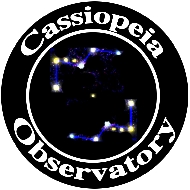Herschel 400 Catalog imaging
Posted: 21 January 2023
|
Open: Friday, 20 January 2023, 1820 MST Temperature: 46°F |
Session: 1821 Conditions: Mostly clear |
Equipment:
12" f/8 LX600 w/StarLock
2" 24mm UWA eyepiece
Camera:
D850 DSLR
1827 MST: LX600 ON, StarLock OFF, High Precision OFF.
Viewed Venus, Saturn, Jupiter, and Mars, 102X.
Viewed M42 (Orion Nebula), 102X.
1834 MST: High Precision ON.
Viewed NGC651 (M76, Little Dumbbell Nebula, planetary nebula), 102X. It would be the first Herschel 400 Catalog imaging object this night.
Prepared the D850 DSLR for imaging.
I then did some light tests of my new Opple Light Tester 3 Pro light meter. I will be using it for some International Dark-Sky Association (IDA) activities.
Next, I mounted the D850 DSLR at prime focus, focused, and locked the telescope primary mirror.
1905 MST: StarLock ON.
I took the following Herschel 400 Catalog images, StarLock autoguided, exposures 1, 2, or 5 minutes, ISO 1600 or ISO3200.
NGC651 (M76, Little Dumbbell Nebula, planetary nebula)

NGC869 (open star cluster)

NGC884 (open star cluster)

NGC615 (galaxy)

NGC720 (galaxy, satellite)

NGC772 (galaxy)

1959 MST: StarLock OFF.
Viewed NGC2024 (Flame Nebula), 102X.
2012 MST: LX600 OFF.
2018 MST: Took a Sky Quality reading.
|
Close: Friday, 20 January 2023, 2022 MST Temperature: 34°F |
Session Length: 2h 02m Conditions: Clear, SQM 20.85 |
Here are two very recent articles on Light Pollution:
Light pollution is skyrocketing
Citizen scientists report global rapid reductions in the visibility of stars from 2011 to 2022
Comments are welcome using Email. Twitter users can use the button below to tweet this report to their followers. Thanks.
Cassiopeia Observatory Home Page
Copyright ©2023 Michael L. Weasner / mweasner@mac.com. Email Etiquette.
URL = http://www.weasner.com/co/Reports/2023/01/21/index.html
